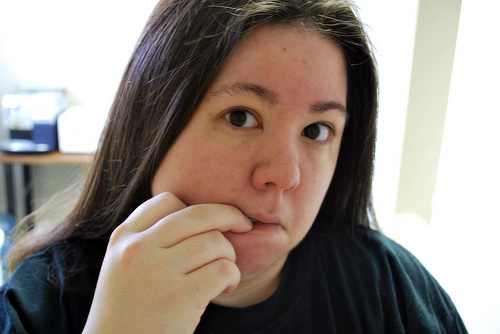
Nail Biting or Onychophagia
The medical term for “nail biting” is onychophagia, because “onycho” means “nails” and “phagia” is the act of eating, or anything else related to that act. It is the persistent habit of biting one’s nails, to an extent where the appearance of the nail and the entire finger is changed, and the habit is noticeable by one’s surroundings. Nail biting is more common in children, 30% of cases occur within 3-10 years, and statistics reveal that approximately 45% of adolescents bite their nails. As for adults, the incidence or nail biting is under-assessed, as most adults are not even aware of it.
- Important notification about information and brand names used in this slideshow!
- Photo courtesy of Morgan by Flickr : www.flickr.com/photos/meddygarnet/3294453521/
- www.mayoclinic.com/health/nail-biting/AN01144
- http://www.emedicinehealth.com/nail-biting-health/article_em.htm
- http://health.howstuffworks.com/skin-care/nail-care/tips/5-ways-to-prevent-nail-biting.htm
- http://www.americanownews.com/story/16143214/nail-biting
- http://www.webmd.com/anxiety-panic/tc/nail-biting-topic-overview
- http://www.npr.org/blogs/health/2012/10/01/161766321/nail-biting-mental-disorder-or-just-a-bad-habit

Why Do We Bite Our Nails?
Well…there are various reasons why we would bite their nails, but “to keep them short” is not really one of them; otherwise we would have used a nail trimmer or cutter! Most of the time, people are found to bite their nails when they are under stress or anxiety, of any source: it could be physical or emotional stress, stress before an exam, before a medical test, before crossing the road, etc. In a general point of view, nail biting is considered as a neurological response to any kind of stress, powerful enough to stimulate our mind and body to react to it.
- Important notification about information and brand names used in this slideshow!
- Photo courtesy of David Jones by Flickr : www.flickr.com/photos/dgjones/309381823/
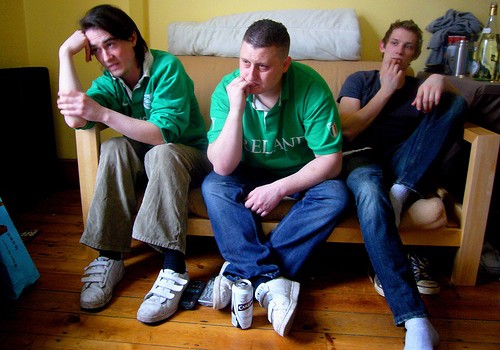
Who Bites Their Nails?
Anyone can be stressed, so anyone can bite their nails! However, children (age 3-11) and teenagers have been identified as the two age groups where the nail biting disorder is more prevalent. Whether this is because they are exposed to a particular kind of stress or not, is unknown. Also, men with eating disorders are also more likely to bite their nails compared to women with the same eating disorders, and the reason for such occurrence is unknown. Children with Obsessive Compulsive Disorder are also at a much higher risk of developing nail biting habits, compared to other children with no impulse control disorder.
- Important notification about information and brand names used in this slideshow!
- Photo courtesy of hunting bear by Flickr : www.flickr.com/photos/love_sex_and_dirty_streets/426806858/
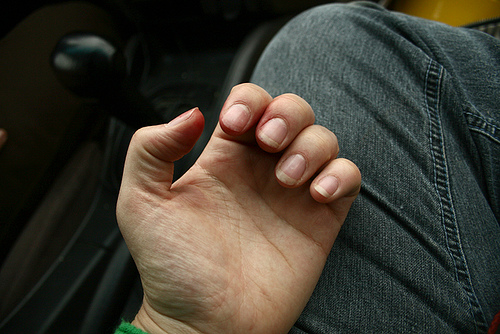
What Problems Can Arise from Nail Biting?
Even though this impulsive habit seems inoffensive and free of consequences, several problems have actually been identified as consequences of nail biting. The first problem is in direct relationship with the function of the nails. Nails are intended to protect the underlying skin of our fingers, which is extremely sensitive to environmental factors. Thus, if our fingers are deprived of their protective nail layers, the skin is exposed to thermal injury as well as bacterial infections. This risk of infection exponentially increases secondary to a broken cuticle, as a result of persistent nail biting. And needless to say, any cut/scratch/wound on the skin is a potential port of entry for microscopic invaders. The nails could also become reddened, swollen and painful, which makes it difficult for us to use our fingers for our daily tasks. In addition to this, nail biting could also cause minor trauma to the gingiva of the teeth (especially when the nails are long). And from a cosmetic point of view, fingers with bitten nails are much less attractive than fingers with normal nails. Lastly, there have also been reports of fingernails deformities secondary to nail biting.
- Important notification about information and brand names used in this slideshow!
- Photo courtesy of Alice Carrier by Flickr : www.flickr.com/photos/land_camera/3602590410/

Is It A Sign of Psychological Disorder?
According to the Diagnosis and Statistical Manual of Mental Disorders, onychophagia could be classified either as an impulse control disorder (DSMR IV) or an obsessive compulsive disorder (DSMR V). This is potentially due to the fact that the majority of people seen with nail-biting have an underlying psychological issue (turmoil) that is unresolved. It is hypothesized that such repressed psychological issues might prompt the patients to exhibit a response to that internal stress, and so they respond by biting their nails. It is also said that people who bite their nails chronically and persistently have an “ana; personality”, or in people who did not resolve the “oral stage of development (15 months to 3 years), according to Erik Erikson. Because of that, they still have a tendency of putting several things in their mouths (this is also hypothesized for people who chew gum excessively.) Another factor that supports the psychological origin of nail biting is the fact that it is associated with other psychological disturbances such as skin-biting, hair-biting or hair pulling (trichotillomania), and tooth-clenching and grinding (bruxism). It is more common in children, and this is potentially due to the fact that it originates at a young age...
According to the Diagnosis and Statistical Manual of Mental Disorders, onychophagia could be classified either as an impulse control disorder (DSMR IV) or an obsessive compulsive disorder (DSMR V). This is potentially due to the fact that the majority of people seen with nail-biting have an underlying psychological issue (turmoil) that is unresolved. It is hypothesized that such repressed psychological issues might prompt the patients to exhibit a response to that internal stress, and so they respond by biting their nails. It is also said that people who bite their nails chronically and persistently have an “ana; personality”, or in people who did not resolve the “oral stage of development (15 months to 3 years), according to Erik Erikson. Because of that, they still have a tendency of putting several things in their mouths (this is also hypothesized for people who chew gum excessively.) Another factor that supports the psychological origin of nail biting is the fact that it is associated with other psychological disturbances such as skin-biting, hair-biting or hair pulling (trichotillomania), and tooth-clenching and grinding (bruxism). It is more common in children, and this is potentially due to the fact that it originates at a young age.
- Important notification about information and brand names used in this slideshow!
- Photo courtesy of RStacker by Flickr : www.flickr.com/photos/jonasphoto/3404852133/
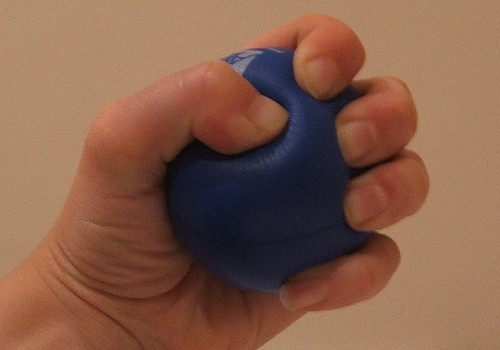
Treatments for Nail-biting
The best way of treating a problem is by starting at its source. Because of the strong and undeniable association between nail biting and psychological disturbances, it is considered and treated as a problem of a psychological origin. This is why behavioral therapies are generally recommended for people with a persistent habit of nail biting. Of course, if you re simply biting your nails before an exam (as a reaction to stress) and do not do it too often or to a worrisome extent, there is no need for booking a weekly appointment with a shrink. However, if nail-biting has become a noticeable habit and biting your nails has cause significant changes in their appearance and the overall look of your fingers; make no mistake: you would definitely benefit from a behavioral therapy. An example of such is Habit Reverse Training (HRT), which goal is to make you “unlearn” the destructive habit and replace it with a more constructive habit.
- Important notification about information and brand names used in this slideshow!
- Photo courtesy of skittledog by Flickr : www.flickr.com/photos/55919472@N00/501307681/
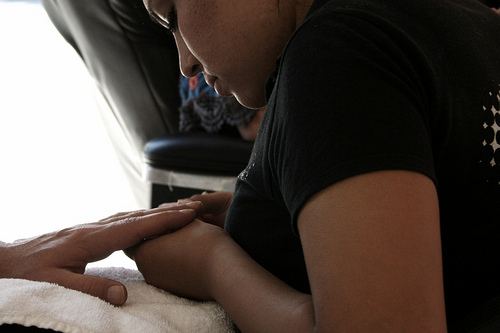
How to Prevent Nail-biting?
Given that nail biting is mostly of a psychological origin, is there truly a way to prevent it? You could say that caring for your kids (especially from 15 months to 3 years) and ensuring that they complete their developmental milestones adequately could help. However, every parent is almost sure that they do they do what is best for their children, so you cannot really go down that road. In addition, you cannot predict whether or not a child is going to develop a nail-biting habit just because he is still breastfeeding at a certain age, when it is supposed to have stopped. We can only retrace back the possible causes of impulsive nail-biting for each individual child (or teen). In the meantime, we can aim at decreasing the occurrence of nail-biting despite the urges, and do some by some cosmetic measures. Bitter-tasting nail polishes are currently the nest solution. They are made of Denatonium Benzoate, and because of their bitter taste they discourage nail-biting by using the classical (Pavlovian) conditioning.
- Important notification about information and brand names used in this slideshow!
- Photo courtesy of Artotem by Flickr : www.flickr.com/photos/artotemsco/4589973200/
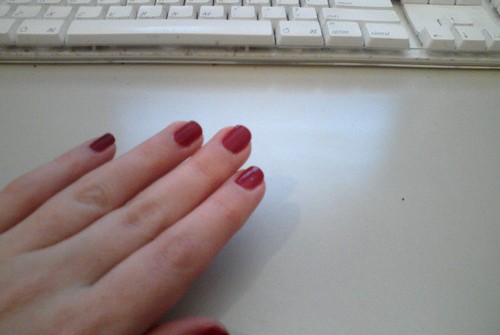
Keep them Groomed!
Another way to prevent nail biting is by keeping them groomed. Ideally, your nails should be cut short and maintained clean, covered with a layer of “bitter-tasting” nail polish if possible. The nail polish itself is clear, so it blends perfectly with your nails, mimicking a normal looking clear nail polish. The reason why nails should be kept short in this case is, you are more likely to bite long nails (since they are long enough, you would believe) compared to short nails. So keeping them short and clean could also be an alternative way of reducing the risks of having you biting your nails.
- Important notification about information and brand names used in this slideshow!
- Photo courtesy of Sarah Sphar by Flickr : www.flickr.com/photos/midwestgrrl/2277600774/

Distract Yourself and Relax
Nail biting can also be triggered when we are stressed, overwhelmed, and anxious. And what is the best way to get rid of stress? You got it right, relax… Take a deep breath, exhale and escape…. It is also recommended to distract yourself because as long as your mind is focused on the object, the thought or the idea that is causing you stress, you will be stressed, and this could prompt you to start biting your nails as a result. So once you feel like you are being stressed, stop immediately: separate yourself from the source of the stress, and reboot your system. Simple ways to help you relax include taking deep breaths (20-30) in and out, calling a friend that is well-known for his very good jokes (or someone who just puts you in a good mood), taking a short nap, etc.
- Important notification about information and brand names used in this slideshow!
- Photo courtesy of FoundryParkInn by Flickr : www.flickr.com/photos/foundryparkinn/3763643238/

Adopt New Habit
Lastly, another way to get rid of nail-biting is by adopting a new, productive habit. This is what the Habit Reverse Training therapy is all about! This might be new to you, but it has long been used for the management and treatment of other behavioral disturbances such as skin pricking, tics or trichotillomania. In Habit Reverse Training, the psychiatrist first trains you to be aware of your disruptive behavior (awareness training). Next, he trains you to now shift your stressful response to something more positive (competing response training). The next step is contingency management, where you are rewarded for positive behavior. And the last two steps of the therapy (relaxation training and generalization training) are intended to teach to manage stress to even prevent you from developing the urge to respond to the applied stress.
- Important notification about information and brand names used in this slideshow!
- Photo courtesy of Sarah Rara by Flickr : www.flickr.com/photos/sarah_rara/382542210/


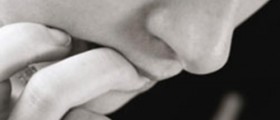
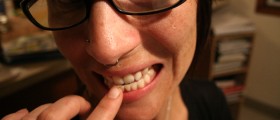
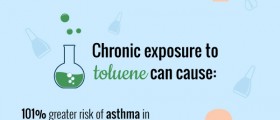
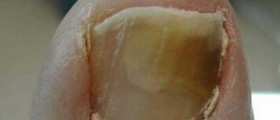
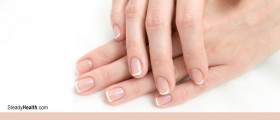
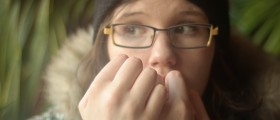



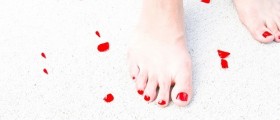

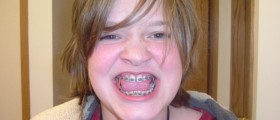
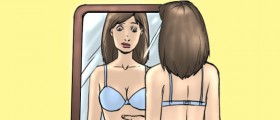

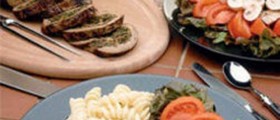
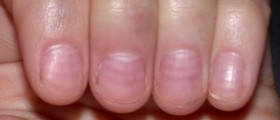


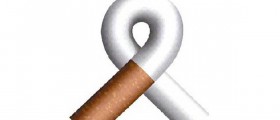
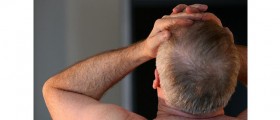


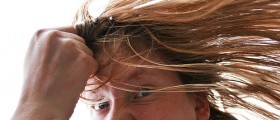
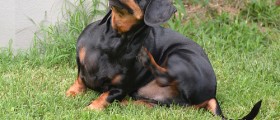
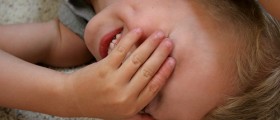
Your thoughts on this
Loading...